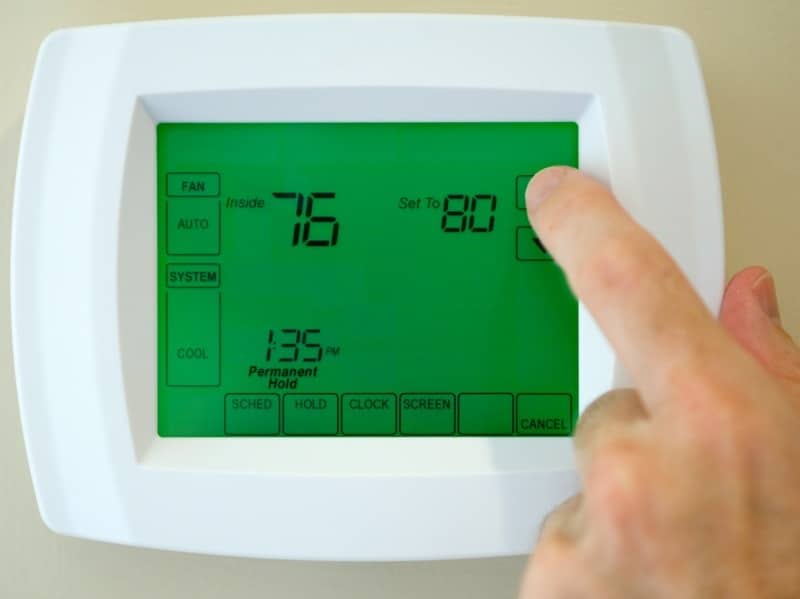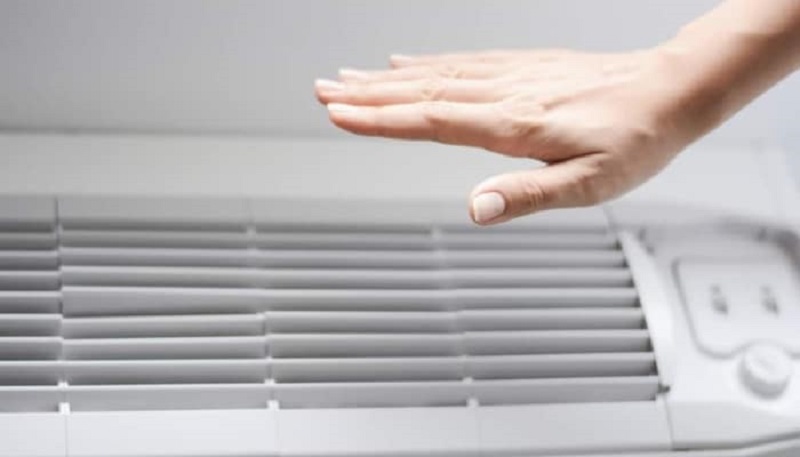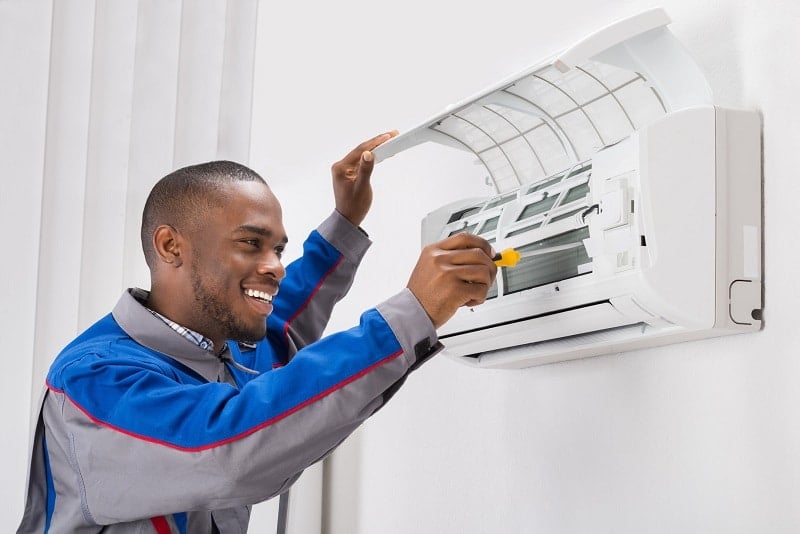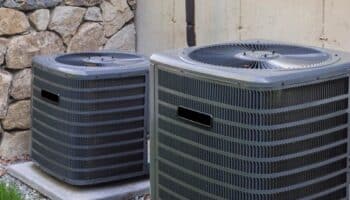We've independently reviewed this article to make sure it's as accurate as we can make it.
To find out more about our article creation and review process, check out our editorial guidelines.
Stuck trying to figure out why your AC runs all day?
Don’t worry, I’ve been there too. I know how frustrating it can be to have this happen, especially because it can cause your electricity bills to skyrocket!
Luckily, you’ve come to the right place to fix this issue.
If your air conditioner is always running, chances are the outside temperature is much higher than your thermostat’s setting, the air filters need to be replaced, or the coils are dirty. A broken thermostat or an old and small air conditioner could also explain the issue.
Keep reading to fix the problem today!
How Long Should an Air Conditioner Run?
Even though factors like airflow, outside temperature, and air conditioner age can have a major effect on this, the ideal amount of time your air conditioner should run is about 15-20 minutes at a time.
This doesn’t mean that you need to panic at the 21 minute mark!
If it’s hotter outside, chill out.
The AC has more work to do. Or if you’ve been away and the home’s gotten hot, the air conditioner needs time to cool the place down, not just keep it cool. However, if your air conditioner is constantly running longer than 20 minutes at a time, it’s time to look into why.
Pay attention to whether your AC is always running or if it’s turning on and off over and over.
It isn’t only running overtime that can be cause for concern. If your air conditioner is running less than ten minutes at a time, it can end up costing you a lot of money. This process is called short-cycling, and is usually the result of your AC being too big for your home.
Bigger isn’t always better, and when your air conditioner is too powerful, it can cool down the air too fast. Even though this sounds good, what that actually means for you is that you’ll feel hotter.
As air conditioners work, they dehumidify the air. That helps us feel cooler because our body’s cooling system relies on the evaporation of sweat. Moist, heavy air doesn’t have as much room for water vapor, making it harder for us to cool down.
This is a problem with a short-cycling air conditioner, because it doesn’t have the time to dry out the air. Even though the house might get cooler faster, it won’t be as comfortable for us.
Worse, with an oversized air conditioner, the cooling and warming cycles will happen faster. Instead of keeping your house at a steady temperature, the unit will be forced to keep turning on all the time, but only for a few minutes. This constant on-and-off can wear out the machinery a lot faster, costing you much more much sooner.
If you’re facing a short-cycling air conditioner, it’s time to call in a local technician to perform a heat-load calculation and see what size unit you should really have.
7 Reasons Why Your Air Conditioner Is Running Too Long
If your air conditioner is worrying you with its constant activity, take a deep breath.
There are a number of reasons why this could be, and it doesn’t always mean an expensive repair is in your near future. In fact, by catching this now, you might be able to avoid the wear and tear this problem could cause in the long run, saving money.
There are a few major possibilities:
#1 The Outside Temperature Is Much Higher
Air conditioners are very powerful machines that can make a big difference in the temperature. However, there’s only so much they can do.
The average air conditioner can only cool down the inside temperature by about twenty degrees. On extremely hot days, we might set the thermostat comparatively low, and that means the AC will have to work extra hard.
If you’re pushing the limits during a short heatwave, you probably won’t cause major damage, but if you spend the entire summer trying to keep your home at sixty, you’re likely to wear out the unit much, much faster than its projected lifespan.
#2 The Thermostat Is Broken
We already know there’s only so much we can ask an air conditioner can do. But sometimes, the house cools down, and the AC keeps running overtime.
If that happens to you, get a thermometer and put it next to your thermostat. Check-in after an hour.
If the temperature has gotten down to your setting (or below) and your air conditioner keeps running, your thermostat isn’t measuring heat properly.
You’ll need to fix it or get a replacement. Although some thermostats do allow you to calibrate it by adding an offset in the programming features.
#3 Your Air Filters Need to Be Replaced
One of the easiest yet most important parts of air conditioner maintenance is making sure the air filters are in working order.
Even a thin coating of dust can really clog them up, and pet hair or even a buildup of particulates like smoke can end up choking airflow.
When this happens, your air conditioner’s fan has to push air through this increasingly tight space, and as it gets dirty, it has to work harder to do less.
That means a dirty filter not only worsens your AC’s performance, but it shortens its life. Depending on conditions, these can be replaced up to every six months. Check on them once in a while.
If you want to get any replacement part – or see how much one would cost – click to enter your model number in the search bar below. Our partners at AppliancePartsPros stock almost every part with free guides on how to install them.

#4 Your AC Is Too Small
It’s common sense that a single window air conditioner in the kitchen can’t keep a four-bedroom house cool, but not all central air conditioners can manage it either.
Though you don’t want to get too large an air conditioner and risk short-cycling, an insufficiently sized unit simply isn’t powerful enough to cool down too large a space.
Whenever you get a new air conditioner, hire a professional to assess your individual needs.
#5 The Coils Are Dirty
A modern air conditioner has two sets of coils: the evaporator and the condenser coils.
The evaporator coils are inside your house and take the heat out of the air. The condenser coils, on the other hand, are outside and release that same heat (it has to go somewhere!).
If these coils get dirty, though, the dust or dirt acts like a blanket. Outside, it traps the heat you’re trying to get rid of in the AC, and inside it keeps it from leaving your house.
Try to make sure these get checked and cleaned during your air conditioner’s annual check-up. If you find ice on your air conditioner’s coils, change the setting from COOL to OFF. Then put the fan setting ON. This won’t keep your house cool, but it will melt the ice. Check out our guide on how properly to unfreeze your AC here.
#6 Air Is Leaking From the House
It makes sense that when you have your air conditioner at full blast, you don’t want to leave the windows and doors open. “You’re letting all the cold out!” goes the common complaint of upset parents everywhere.
But did you know that your house might be leaking that cold anyway? When this happens, your AC needs to run longer and work harder to maintain the desired temperature.
Check for any air leaks and remember, the better your insulation, the more of that precious cool you can keep inside!
#7 Your Air Conditioner Is Just Too Old
If your AC runs all day, there’s a good chance you need to replace it.
Nothing lasts forever, and an air conditioner can’t be expected to make it too much further than the twenty-year mark.
Careful maintenance can extend its lifespan, but eventually, you’re going to have to get a new one. It’s never fun to have to get a new appliance, but it’s not all doom and gloom.
Newer air conditioners are far more energy efficient than those made a decade ago, and that means you’ll save money every year! Check out the Energy Star ratings when you shop and talk to your local professionals. Who knows? You might just be glad you had to replace it.
Is It Safe to Leave Your Air Conditioner Running All Day?
As long as your AC is pumping out cold air and isn’t making any unusual noises, running all day won’t cause any disaster.
In fact, a constantly running air conditioner is a healthier air conditioner than one that has to start and stop over and over again.
Turning on and off causes extra wear and tear. However, the twenty-year lifespan of an air conditioner assumes that the AC gets a rest now and then.
When it’s really hot out, you might have to leave it chugging away all day, and that’s ok. Just give it a rest when you can.
If your AC is running, but no cold air is coming out of the vents, that’s a sign you should turn it off. Something isn’t working right. Check the filter and coils and call a professional. A little discomfort now can save you big in the long run.
3 Simple Tips to Improve the Efficiency of Your Air Conditioner
No matter what, running the air conditioner will never be the cheapest part of our lives. Together, heating and cooling make up half of the average American energy budget.
However, there are some ways to alleviate the burden, other than just doing without.
- Get that yearly check-up: an ounce of prevention is worth a pound of cure. The number one way to keep your air conditioner working long and working well is to get a technician to come out and give it a once-over every spring. This won’t only keep it working better and longer, but it can help catch problems like a refrigerant leak before they get expensive.
- Give it a rest when you can: In the heat of summer, sometimes you need that cold air, and that’s okay. Where possible, though, you’ll want to at least lighten the load. When you go out and when you go to bed, turn your thermostat up four to seven degrees. Give the AC a break when you’re not able to fully appreciate it.
- Consider a dehumidifier: Even though your AC dehumidifies as it works, a dehumidifier can help you feel well enough to give the AC a break. Humid air feels hotter, so by running a dehumidifier, you’ll be able to feel cooler at higher temperatures. That means you can give the AC a break—saving two to five percent of its electricity use per degree of the difference!
There are a lot more techniques than this to keep cool and keep smart. Check out our guide on getting the most out of your air conditioner here.
Conclusion
An always-running air conditioner isn’t necessarily a sign of bad things to come. If it’s the right size for your house, it’s probably just working hard because of an easy-to-fix clogged filter or a hot spell.
This is the kind of issue worth looking into, but you’re probably going to be just fine. If you can’t narrow down the cause with this guide, call in a professional, and they’ll be able to help you keep it from turning into a big problem.
Thank you for checking out this article! If you have time, consider looking at some of our other articles on air conditioners! Enjoy your cool air and the confidence that you know how to keep it flowing!











